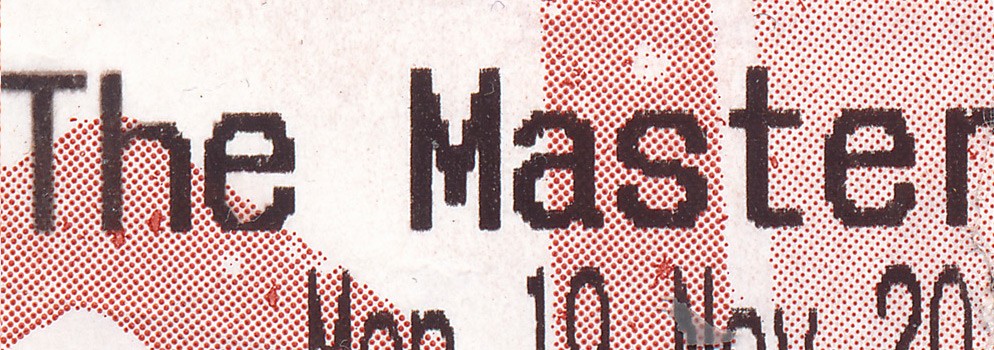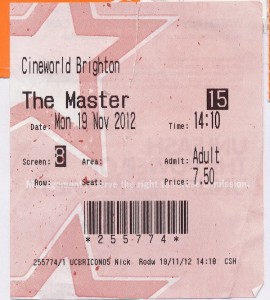The Master

Welles would have read this!
The Master. Should I even bother? It’s not exactly a funny or even very insightful piece about a film I might be able to feel non-plussed about, if only the film was a smidgen more feh.

In fact, by writing anything, I’m risking revealing my rage at how bland films are continually singled out as ‘good’ or ‘great’ or ‘at least I didn’t œdipus’. In fact, what critics and even the film itself seem to be telling me is that having a feeling, or even just an opinion might not be ambiguous enough to be ‘ART’. So: why should I let them even KNOW about my overwhelming FURY that the way to gainsay praise is TO SAY NOTHING. NO! I REFUSE TO GIVE IN! I WILL NOT ENGAGE IN THIS FALSE NON, um, NON-CONTROVERSY! NO ONE MUST KNOW ABOUT MY RAGE!
RAGE!
On the other hand, I did come up with a fairly decent title on the bike ride home, so off we go.
In a nutshell, or exploded tomato, take your pick: there are a lot of interesting stories to be told about scientology. This isn’t one of them. Or, given the films meander, this isn’t ten of them. South Park did more with less. The sad reality, given the subject and filmmaker, is that The Master, given the subject and the filmmaker, could have been a generational Citizen Kane. It isn’t. Or perhaps more worryingly, it is.
And while it’s true there’s nothing worse than bombing on stage, there’s also nothing better than when you don’t.
Oh, right. Forgot. There is one thing worse.
[/pullquoteL]It may seem unfair to critique this film vis a vis scientology, but the film demands it, or rather out of generosity I do. Without this reference, the film would otherwise be nothing but a TV movie (is there sexual tension between Mr. Hoffman and Mr. Pheonix? Maybe! I’m adrift with excitement!) and I like TV movies. But the addition of the ‘real’ in the form of realism and ‘acting’ – arthouse staples that feel so very tired these days, they are as past their sale by date as this very expression – is of course what makes in the Kane of its generation. Fitting with the tweensies, or whatever we’re calling ‘now’, um, now, the film is yet another hyper-serious film. This is troubling especially given the fact that Mr. Anderson used to make fun, funny and epic movies. Don’t get me wrong. The Master is, to its credit, slightly less terrible than There Will Be Blood, about which I failed to write my impressions down here, dear reader. My apologies. They were, concisely, ‘that wasn’t – technically – the worst film ever made’. Mediocre and uninvolving, The Master is instead an telling example of where where we have meandered so cowardly ourselves.
As we open with Mr. Phoenix desperately humping a woman carved in the sand, first making his sailor friends laugh, and then taking it too far, we are treated to the atonal plonkings of Mr. Jonny Greenwood, which tells us that he is taking it too far. Which I never would have guessed when he starts masturbating openly on the beach. To atonal plonkings. Ted did more with less. Something that Mr. Anderson himself seems to know.
Not that the film doesn’t have its moments – there’s a nice bit of interrogation, a near Meisnerian exercise, where Mr. Anderson, Mr. Phoenix and Mr. Hoffman simulate his cult’s version of an intake, a series of questions where the requirement that the interrogatee must not break eye contact with the interrogator. The scene provides a brief arena of physical constraints for the actors and the results have the resonant quality of contained chaos, instead of the tiresome quality of chaos unbound. The reverberations from this scene, as do Mr. Anderson’s past films, trick the poor viewer into the vain hope of seeing something slightly more compelling in the film than Mr. Phoenix almost always beating someone up. Mr. Anderson seems to know this when he has the characters refer to the scene at the end, which seems less a symmetrical narrative device than an act of contrition.
If we focus on why this scene works, and the rest of the film utterly fails to, there’s a sense of revealing the difference between the real and the true. The real represents; the true crystallizes. And if I’m being deliberately obscure to hide my own cock hanging out, let me be clear: the true is the moment that is both, that captures the general and the specific, or rather it captures the general with the specific. Scenes of Mr. Hoffman riding a motorcycle in the desert, followed by…Mr. Phoenix riding a motorcycle in the desert may be accurate. They may even be real. But they are not true.

Screen 8, Cineworld Brighton. This was an augur, since it was the same where I saw Silent Hill; Revelation the week before. SH:R is exactly 32% better, as measured by the fact that it is exactly 32% shorter. They are otherwise the exact same film.
And if I’m calling this the Kane of its age, it’s for this reason: we’re all chickenshit now. There’s a lot of films, and a lot of people to praise you when you make them, that sneak around what they want to say. Realism, via performance, period props, mumbling, lack of plot, etc., is nothing more than cheap trick to avoid looking like an idiot. The entire film (see music, above) reminds me of the ending of Magnolia, which always bugs me. It’s a great, great film, but if I fast-forward bit in SotL where Clarice is chasing Jaime Gumb in the basement (yawn), we can agree that no one is immune. For Magnolia, this is the part where Mr. Anderson plays the music over the last bit of dialog between Mr. C. Reilly and Ms. Walters. And while I thank God it’s not plonkity-Greenwood-plonk plonkings-Greenwood, it comes off, as do his last two films, like an oily combination of contempt for the audience, and a tentativeness as to what he actually has to say.
One could say that great art shouldn’t be a cop-out, but historically speaking, that’s just stupid. One instead says: I detest art because it’s always a cop-out, and instead love melodrama, action, videogames, comedy, television and snack foods. I’m sure I’ll have more to say on things two, three, five and six later, but for now I’ll say that the great thing about melodrama and comedy (and Mr. Anderson’s earlier films are this) is that the filmmakers/performers/writers are letting it all hang out. And while it’s true there’s nothing worse than bombing on stage, there’s also nothing better than when you don’t.
Oh, right. Forgot. There is one thing worse.
Profits!
Losses!
-$23.25
The Lonely Comments Section

 [logo]
[logo]